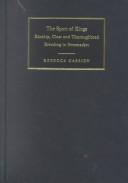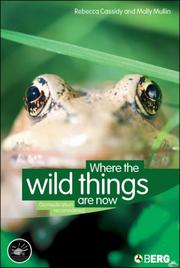| Listing 1 - 10 of 14 | << page >> |
Sort by
|

ISBN: 0521808774 0511177615 0511044747 9786610436392 0511613768 0511305109 0511148011 1280436395 1107131731 0511016417 9780511016417 9780511177613 9780511613760 9780511044748 9780511148019 9781280436390 9780521808774 9780521004879 052100487X 9781107131736 6610436398 9780511305108 Year: 2002 Publisher: Cambridge : Cambridge University Press,
Abstract | Keywords | Export | Availability | Bookmark
 Loading...
Loading...Choose an application
- Reference Manager
- EndNote
- RefWorks (Direct export to RefWorks)
The Sport of Kings is an ethnography of the British racing industry based upon two years of participant observation in Newmarket, the international headquarters of flat racing. Racing in Britain provides a lens through which ideas of class, status, tradition and hierarchy can be examined in an environment which is both superficially familiar and richly exotic. This book explores concepts about 'nature' specific to thoroughbred racehorse breeding, and pursues the idea that in making statements about animals, we reveal something of ourselves. It explains the action that takes place on racecourses, in training yards, on studs and at bloodstock auctions. It analyses the consumption of racing through betting on the racecourse and in betting shops, and it proffers an insightful description of a unique class system: that of the humans and animals involved in the production of British flat racing.
Horse industry. --- Horse racing. --- Horse racing - England - Newmarket. --- Race horses. --- Thoroughbred horse. --- Thoroughbred horse --- Race horses --- Horse racing --- Horse industry --- Recreation & Sports --- Social Sciences --- Breeding --- Equine industry --- Horse business --- Flat racing --- Horseracing --- Racehorses --- American thoroughbred horse --- Animal industry --- Horse sports --- Racing --- Competition horses --- Working animals --- Horse breeds --- Anglo-Arab horse --- Anthropology --- Chevaux de course --- Éleveurs de chevaux --- Course de chevaux --- Classes sociales --- Anthropologie culturelle --- Grande-Bretagne --- Grande-Bretagne Pur-sang --- Élevage --- Aspect social --- Newmarket (Suffolk, GB) --- Angleterre --- Aspects sociaux
Book
ISBN: 9781138924550 Year: 2013 Publisher: London : Routledge,
Abstract | Keywords | Export | Availability | Bookmark
 Loading...
Loading...Choose an application
- Reference Manager
- EndNote
- RefWorks (Direct export to RefWorks)
Book
ISBN: 9781139012768 9781107013858 9781107618367 Year: 2013 Publisher: Cambridge Cambridge University Press
Abstract | Keywords | Export | Availability | Bookmark
 Loading...
Loading...Choose an application
- Reference Manager
- EndNote
- RefWorks (Direct export to RefWorks)
Book
ISBN: 9781637309629 Year: 2021 Publisher: [Place of publication not identified] : New Degree Press,
Abstract | Keywords | Export | Availability | Bookmark
 Loading...
Loading...Choose an application
- Reference Manager
- EndNote
- RefWorks (Direct export to RefWorks)
Women --- Employment --- E-books
Book
ISBN: 1786805871 Year: 2020 Publisher: London : Pluto Press,
Abstract | Keywords | Export | Availability | Bookmark
 Loading...
Loading...Choose an application
- Reference Manager
- EndNote
- RefWorks (Direct export to RefWorks)
Book
ISBN: 1786805863 9781786805867 9781786805874 1786805871 9781786805881 178680588X 0745340393 9780745340395 0745340393 9780745340395 0745340385 9780745340388 Year: 2020 Publisher: London
Abstract | Keywords | Export | Availability | Bookmark
 Loading...
Loading...Choose an application
- Reference Manager
- EndNote
- RefWorks (Direct export to RefWorks)
Book
ISBN: 1107487110 1139012762 Year: 2013 Publisher: Cambridge : Cambridge University Press,
Abstract | Keywords | Export | Availability | Bookmark
 Loading...
Loading...Choose an application
- Reference Manager
- EndNote
- RefWorks (Direct export to RefWorks)
People have been racing horses for thousands of years, all over the world. Yet horseracing is often presented as an English creation that was exported, unaltered, to the colonies. This Companion investigates the intersection of racing and literature, art, history and finance, casting the sport as the product of cross-class, cosmopolitan and international influences. Chapters on racing history and the origins of the thoroughbred demonstrate how the gift of a fast horse could forge alliances between nations, and the extent to which international power dynamics can be traced back to racetracks and breeding sheds. Leading scholars and journalists draw on original research and firsthand experience to create portraits of the racetracks of Newmarket, Kentucky, the Curragh, and Hunter Valley, exposing readers to new racing frontiers in China and Dubai as well. A unique resource for fans and scholars alike, reopening essential questions regarding the legacy and importance of horseracing today.
Book
ISBN: 0415659388 1306111994 1138924555 0203718879 1134445857 113444592X Year: 2013 Publisher: Taylor & Francis
Abstract | Keywords | Export | Availability | Bookmark
 Loading...
Loading...Choose an application
- Reference Manager
- EndNote
- RefWorks (Direct export to RefWorks)
Gambling is both a multi-billion-dollar international industry and a ubiquitous social and cultural phenomenon. It is also undergoing significant change, with new products and technologies, regulatory models, changing public attitudes and the sheer scale of the gambling enterprise necessitating innovative and mixed methodologies that are flexible, responsive and ‘agile’. This book seeks to demonstrate that researchers should look beyond the existing disciplinary territory and the dominant paradigm of ‘problem gambling’ in order to follow those changes across territorial, political, technical, regulatory and conceptual boundaries. The book draws on cutting-edge qualitative work in disciplines including geography, organisational studies, sociology, East Asian studies and anthropology to explore the production and consumption of risk, risky places, risk technologies, the gambling industry and connections between gambling and other kinds of speculation such as financial derivatives. In doing so it addresses some of the most important issues in contemporary social science, including: the challenges of studying deterritorialised social phenomena; globalising technologies and local markets; regulation as it operates across local, regional and international scales; and the rise of games, virtual worlds and social media.
Gambling --- Gambling industry. --- Research. --- Leisure industry --- Betting --- Chance, Games of --- Games of chance --- Gaming (Gambling) --- Games --- Casinos --- Wagers --- gambling research --- gambling --- contemporary social science --- Bookmaker --- Online gambling --- Slot machine --- Spread betting

ISBN: 100308737X 1000189880 100308737X 1000183254 1474215955 1282473638 9786612473630 184788332X 9781847883322 9781845201524 9781847883322 1845201523 9781845201531 1845201531 Year: 2007 Publisher: Oxford New York Berg
Abstract | Keywords | Export | Availability | Bookmark
 Loading...
Loading...Choose an application
- Reference Manager
- EndNote
- RefWorks (Direct export to RefWorks)
Domestication has often seemed a matter of the distant past, a series of distinct events involving humans and other species that took place long ago. Today, as genetic manipulation continues to break new barriers in scientific and medical research, we appear to be entering an age of biological control. Are we also writing a new chapter in the history of domestication? Where the Wild Things Are Now explores the relevance of domestication for anthropologists and scholars in related fields who are concerned with understanding ongoing change in processes affecting humans as well as other species. From the pet food industry and its critics to salmon farming in Tasmania, the protection of endangered species in Vietnam and the pigeon fanciers who influenced Darwin, Where the Wild Things Are Now provides an urgently needed re-examination of the concept of domestication against the shifting background of relationships between humans, animals and plants.
Domestication --- Domestic animals --- Plants, Cultivated --- Human-animal relationships --- Human-plant relationships
Book

ISBN: 9781845458904 Year: 2009 Publisher: New York Oxford
Abstract | Keywords | Export | Availability | Bookmark
 Loading...
Loading...Choose an application
- Reference Manager
- EndNote
- RefWorks (Direct export to RefWorks)
| Listing 1 - 10 of 14 | << page >> |
Sort by
|

 Search
Search Feedback
Feedback About UniCat
About UniCat  Help
Help News
News